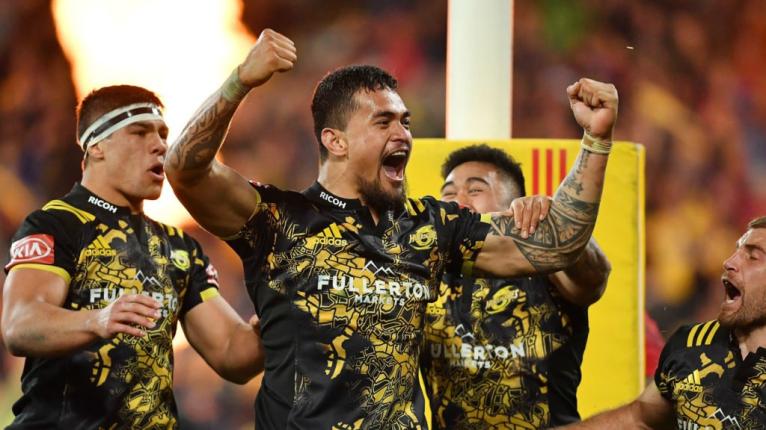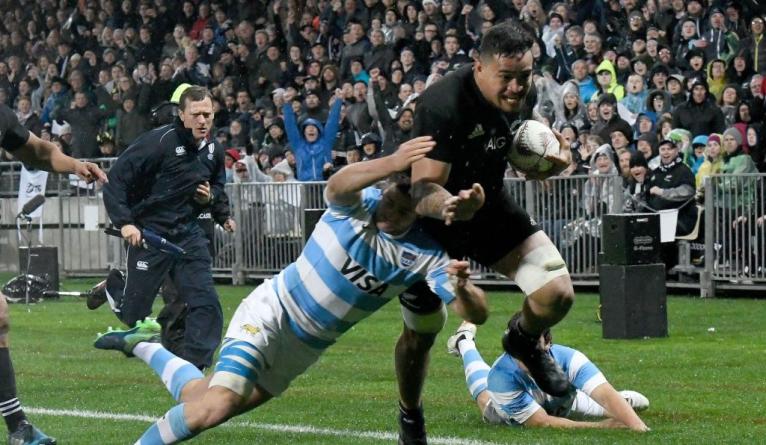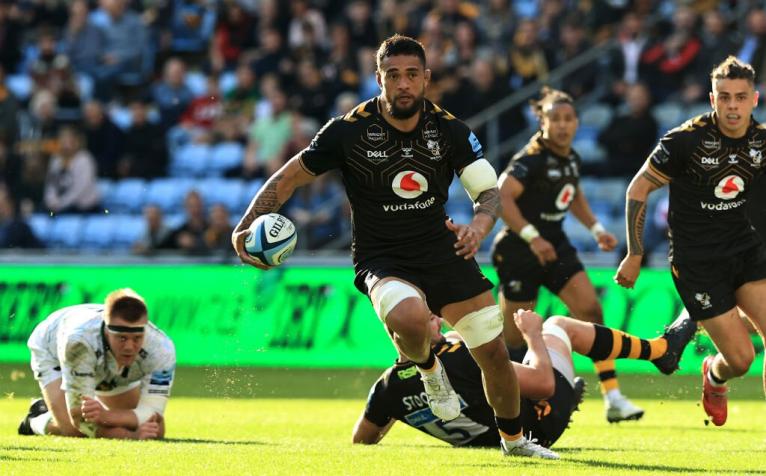The boy’s story begins in paradise, but for Vaea Fifita, formative years on the arrestingly beautiful Tongan islands were anything but idyllic.
Fifita was three when his parents divorced, emigrated and left four children on the breadline with their grandparents. He later went nine years without hearing from his father, who had lost everything and resorted to begging. His ‘nana’ scraped together what she could to send the kids to school.
The brutal parameters of life on Vava’u, one of Tonga’s smaller archipelagos, did not cater for grand dreams. Fifita believed he was destined to become a farmer. Just like so many of his people, he would work the vanilla crops that offer sustenance to the Vava’u economy.
Never did he dare imagine himself as a professional rugby player, let alone one anointed Super Rugby champion, an All Black and an intoxicating addition to Wasps and the Gallagher Premiership.
“It’s funny how some people say life is hard here in the UK,” the 29-year-old back-five forward tells The XV. “When I was in New Zealand, some people said life was hard there. Back in Vava’u, that’s what you call hard.
“You have to work. You can’t just sit down. You have to work from six in the morning to the afternoon. Most people go to the plantations. I don’t want to talk about it because I don’t want to take my memory back there. It’s been tough, but luckily the man above led me in the right direction.”
In Vava’u, a week’s work is probably worth 80 pa’anga, which is about £25. That’s how much you get.
Fifita is reluctant to leaf back through those harsh early chapters, but to truly understand what drives the man, you must get a feel for his childhood hardship.
“My dad went to the United States and my mum went to New Zealand after they divorced,” he says. “We stayed – my two brothers, my sister and me – with my nana and grandpa.
“We had to pay for school. In Vava’u, a week’s work is probably worth 80 pa’anga, which is about £25. That’s how much you get. My nana used to work to pay for us.
“From the age of eight to the age of 17, I didn’t talk to my dad. We always asked him for money to pay for our school, and he became homeless for nine years. I asked him last year, and he said it was because we kept asking for money and he ran out.
“We always messaged him on Facebook and I asked him why he didn’t reply. He didn’t want us to see him begging on the street. Luckily, a Tongan woman found him and took him in, looked after him, and now they’re together.
“My mum is in Auckland, and I still have a strong connection with her. They have both remarried, which is good. It’s still family. But now it’s better.”

In his teens, Fifita took the first of several leaps. You get the feeling he looked around, gazed at the almost preordained future stretching out before him, and decided he wanted more. Off he went to Tongatapu, the nation’s main island, to finish school and see what path he could forge.
“I thought I’d be in Vava’u my whole life. It was tough. I made the decision to go to Tongatapu for school. I just bluffed it, but here I am.”
The soft innocence to Fifita’s oratory belies his inner steel. He fought his way into the Tongan Under-18s squad that toured New Zealand in 2009. When the team played Auckland Grammar, word reached him a prominent coach with a scholarship up his sleeve would be watching.
The man in question was Richie Harris, head of rugby at the city’s prestigious Tamaki College. His influence on Fifita’s rise would be profound.
“Back then, I didn’t know any English. Richie Harris came up to me after the game – he was talking to me and I was like, ‘yep, yep, yep’. A Tongan guy translated.
“I was 18 that year. They were looking to give me two years (on the scholarship), but if I said I was 18, they’d only have given me one. I said I was 17. They did all the visa work, got my passport, and when I landed, I went to the school and met Richie. The first thing he said to me was, ‘you bloody Tongan’. He was laughing. ‘You told me you were 17’. He knew I was 18 by then. But I got two years… you’ve got to do what you’ve got to do, man.”
Before my first All Blacks game, I was stood there singing the anthem, imagining myself back in Vava’u watching myself on TV. I almost cried.
In a foreign land with an alien language, sport was Fifita’s constant.
“I was not good at school because it was in English. It didn’t stop me trying to get better. I tried to nail rugby, and if I did that well, language didn’t matter. That was what motivated me.”
Rugby, emphatically, was nailed. Fifita’s ballast, searing speed and footballing acumen were soon noticed. Auckland invited him to try out for their Mitre 10 Cup squad, but the selectors passed – a decision, you can only presume, they came to regret.
Harris encouraged him to go south to Wellington, where the Hurricanes saw what the Blues did not. In his first season of men’s club rugby, Fifita played like a beast unleashed, scoring 27 tries for the Wellington Axemen. He made his Super Rugby debut – fittingly against the Blues – at the tail end of 2015, the farewell match for departing titans, Ma’a Nonu and Conrad Smith. A year later, his blistering game earned him a starting berth in the Hurricanes champion vintage. He was soon registering a very large blip on Steve Hansen’s radar.
“The boys believed in and trusted each other in 2016; we were the first team to win it for the Hurricanes,” Fifita says.
“When you walk into the training base, you have the board of the 23 who played in the final, which made it special. It was a cool moment. I’m not sure my name is still up there – they’ve probably taken it down now.
“Before my first All Blacks game, I was stood there singing the anthem, imagining myself back in Vava’u watching myself on TV. I almost cried. I dreamed of being a farmer, but here I am running around with a rugby ball.”

Ask Fifita what he takes with him from the All Blacks and he talks about the incredible try against Argentina in his second Test in 2017. The barnstorming 40m surge left backs flailing in his slipstream and will be forever etched in his memory.
He talks, too, about the sheer ferocity of competition for places, in sharp contrast to the warmth of the environment itself.
“I learned a lot in the All Blacks, especially from Kieran Read and Sam Whitelock – on line-out defence, how to deal with what the opposition do, the speed of my jump.
“Kieran Read always sat down with me and a laptop and went through every game. It is quite special to have someone spend their time with you, when you’re new to the team, to look at your game and help you get better.
“(The competition) is really tough. Especially if you’re new, you already know there’s no chance (of starting). You know Brodie Retallick and Sam Whitelock are the two locks. You know Kieran Read, Ardie Savea and Sam Cane will be the back-row. In your head, you don’t give up, you make sure you stand up and train, but it is quite hard.”
I won’t say which, but I had three UK teams interested in me. To be honest, I was close to going to another team.
In the end, injuries, exposure and the bevy of rivals denied Fifita a place at the 2019 World Cup. At times, he struggled to understand Hansen’s selection rationale. With 11 caps in the bag, and fearing stagnation, he decided to leave New Zealand. Brad Shields and Jeff Toomaga-Allen, fellow 2016 Hurricanes, extolled the virtues of Wasps and the English midlands.
“The plan was to make the 2019 World Cup squad. I didn’t make it. That was frustrating. After that, in my head, it was time to move. And plus, I didn’t get any game time with the Hurricanes. That’s why I came here.
“I won’t say which, but I had three UK teams interested in me. To be honest, I was close to going to another team. Because of Brad and Jeff, and because Wasps made the Premiership final in 2017 and I had watched it back in New Zealand, it made my decision easier.”
Fifita took a little while to acclimatise. The game here, he says, requires more brutality than rugby in New Zealand. But at 6ft 6ins and over 110KG, that isn’t a problem.
“Super Rugby is way faster. In England, it is more physical and there is more set-piece. When I first came, I looked at some boys and they were big. Jeff and Brad told me everybody loves doing weights.
“In New Zealand, if we did lower body on the Monday, you weren’t allowed to do any extra upper body. Here, if we do upper body one day, after your weights, if you want to do extra, you can do it and the trainer will love to see it.”
Lee Blackett encouraged his marquee acquisition to express himself. Why else would he have brought him all this way? Four games into the season, the performances are coming. Fifita laced the early throes of his Wasps career with scorching line breaks, rampaging carries and massive defensive industry.

In the past two matches, he has gained over 100m, beaten eight defenders and made 29 tackles. Even in defeat, the speed at which he hunted down Newcastle Falcons centre George Wacokecoke on the counter was astonishing.
Wasps’ start to the campaign has been solid – two fine wins, two frustrating losses. Saracens and their pack of international-class monsters await on Sunday and how they will go after Blackett’s eight.
“There is nothing better than playing against, almost a British and Irish Lions or England forward pack,” Fifita says. “You find who you are, if you know what I mean. I am looking forward to the challenge. Hopefully we get the job done.
“It took me a few games to get used to Premiership rugby. In the past two games, against Northampton and the Chiefs, I was way more confident and knew what to expect.
“Lee Blackett said to make sure I go out and be myself, and don’t go into my shell. I have to have fun. This is the first time I’ve enjoyed rugby this much in my career.”
Fifita is determined to safeguard his wife and two boys from the turmoil of his own youth. He can nod to the memories of Vava’u, while smiling warmly at the present.


So glad Va'ea is enjoying NH rugby. He definitely has great potential but needs to be continually challenged for best and more consistent results IMHO!